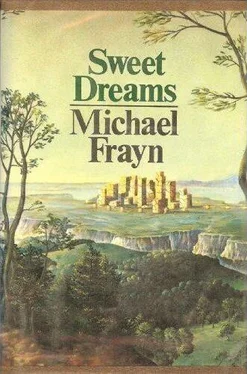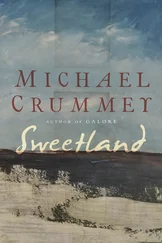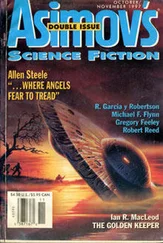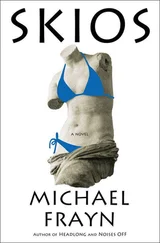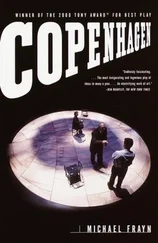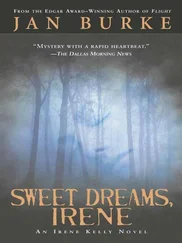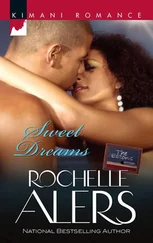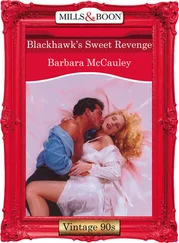“I’m sorry,” he says belatedly. “Boring on like this about myself. What are you doing these days?”
But Freddie reacts oddly to this question. He looks away and takes another dry biscuit.
“Oh,” he says. “Me. Well. You haven’t heard?”
“No?” says Howard.
“Well,” says Freddie, not meeting Howard’s eye. “I’m afraid I’m God.”
“I beg your pardon?” says Howard.
Freddie clears his throat, and forces himself to look Howard in the eye.
“I said, I’m God.”
He folds his arms very tightly, and looks away over Howard’s shoulder. He is plainly embarrassed. So is Howard. He is embarrassed to have embarrassed Freddie.
“I’m terribly sorry,” says Howard.
“Can’t be helped,” says Freddie. “Just one of those things.”
“I mean, I’m sorry not to have known.”
“Not at all. I’m sorry I had to spring it on you like that.”
There is an awkward silence. Freddie fiddles with his dry biscuit, breaking it into small pieces, and dropping crumbs which catch in the hairy surface of his trousers.
“Well,” says Howard. “Congratulations.”
“Oh,” says Freddie. “Thanks.”
The more Howard thinks about it, the less he knows where to look or what to do with his hands. He tries putting them behind his back and looking at the floor, smiling reflectively. Freddie is having difficulties, too. He puts his dry biscuit down, and with his left hand seizes his right elbow. With his right hand he takes hold of his chin. Then he, too, examines the floor.
“On second thoughts,” he says, “I don’t know about congratulations. Not like being elected to a fellowship, or whatever. Wasn’t open to other candidates, you see.”
“Of course not,” says Howard.
“Bit difficult to put the thing into words, really. One is who one is. That’s about it, I suppose.”
“But that’s what counts, isn’t it? Being who one is. One is who one is, so one does what one does.”
Freddie sighs.
“Not a great deal one can do,” he says, “if one is who one is in this particular case.”
Howard raises his eyebrows.
“Surely …” he says.
“No, no,” says Freddie. “One can’t go writing letters to the papers, like you. The more one can do, the more careful one has to be not to go and do it. One has to think twice before one orders a cup of coffee, in case one’s making use of one’s position. One ends up pretty much as a signature on cheques.”
“But …” says Howard.
“To get anything done at all,” says Freddie, “one has to move in tremendously mysterious ways. Terrifically glad if you could bear to look in for a drink the next time you’re in town. See if we could combine forces.”
It’s funny to be driving up to town again. Howard is wearing a very pale grey suit, with a pale blue shirt and a white silk tie, to set off the suntan he has acquired in the country. As he approaches the city on the freeway the same old restless excitement stirs in him that he felt on that first apocalyptic evening all those years ago. Under the clear summer morning sky the traffic thickens. All around him other men in pale suits are driving into town. Their shirts are crisp, their chins smooth, their cuffs stretch beyond their sleeves and rest lightly on their gold watch bracelets. They are self-contained, metropolitan, moving calmly towards their metropolitan importances.
And outwardly he is exactly like them.
Only browner.
There’s the Pan-Am sign. And Dagens Nyheter . There’s a new one, too, advertising Stella Artois. Things are changing.
And there, suddenly, as the expressway turns to cross wharves and black industrial water, are the towers of the inner city, grey-blue against the white-blue of the lower sky; authoritative and heart-stopping, in spite of everything.
The temperature is seventy-seven, the humidity in the low thirties. The stock market is rising.
And here he is, returning in triumph from his exile, for drinks with God, no less!
He walks round the streets he walked round on that first morning. Here’s the cafe where he sat down and read all the papers, trying to understand the local politics. Here’s the shopping street he walked along, and, lingering in it like the smell of coffee, the first impression of the whole city that he based on it.
Here’s the flight of steps and the balustrade where he first set eyes on Rose.
A bus passes with a familiar number. On an impulse he runs after it and jumps aboard. It climbs steeply through trees, into quiet hillside streets from which little lanes and stairways drop suddenly down into the blue distances of the city. By the Congregational Church he gets off, and walks along the small gravelled cul-de-sac to their old house.
It’s much smaller than he remembered it. He always thought of it as some kind of converted dungeon, but he sees now, with a wry smile, that it’s really just an ordinary suburban house. Through the living-room window he can see a playpen, and a child’s pot standing on the table.
The creosoted gate leading to the sideway and the back parts of the house judders open, sticking in its frame, and a youngish man emerges. He is slightly overweight, with a high, balding forehead, and dry hair that floats in the wind.
“Can I help you at all?” he asks Howard politely.
“Sorry,” says Howard. “I was just looking at the place. I used to live here.”
“Really? Well, come in. Take a proper look.”
And he very kindly shows Howard all over the house and garden.
“We love it,” says the man. “We were very lucky to find it, as a matter of fact. The children can walk to school without crossing a road anywhere. And it’s a rather good school. Quite high academic standards — but with a reasonable social mix.”
Howard had vaguely remembered a whole series of gardens and courtyards, overhanging the city below. He almost laughs when he sees what it really is — a small lawn, with a rockery and kitchen garden beyond. You can only get the famous view of the city by standing on the compost-heap against the fence at the bottom.
He can’t help being rather touched by the young man’s enthusiasm about it all. Howard takes to him. He’s got the kind of seriousness which he admires, and a certain way of leaning forward as he shows Howard round, as if he is eager to understand the world but finds it rather difficult.
“It’s quite handy for my work, too. I’m in mountains. I don’t know whether you’ve seen anything in the paper about a mountain called the Matterhorn …?”
Howard turns and looks at him sharply. Of course! It’s himself, ten years younger.
Howard is relieved and pleased that his younger self could pass such a test; to have been in his own company for fifteen minutes or more, and to have been so opaque and convincing that he’d seemed to be like anyone else. He examines the young man curiously. Now that he knows it’s himself he can’t help noticing the slightly more ridiculous and embarrassing qualities — the way the young man frowns importantly as he talks about his job, and waves his arms about when he gets stuck for words; and the way he smiles insincerely at Howard from time to time, and looks straight into his eyes in an effort to demonstrate that he is interested in Howard as well as himself. But since he never even notices that Howard is himself Howard takes this with a pinch of salt.
In the end Howard tells him. The young man stares at him, appalled.
“Don’t worry,” says Howard, grinning. “You’re doing fine. I’m really quite pleased. You keep on like this, and one day you may find yourself in my position.“
The young man recollects himself, and manages a polite smile.
Читать дальше
